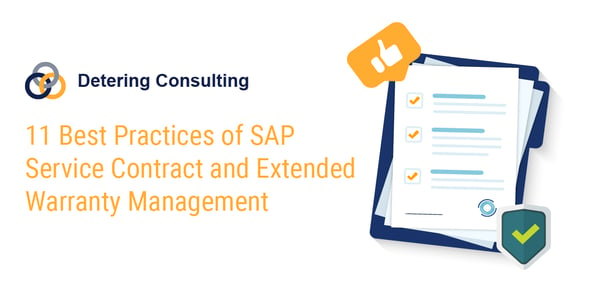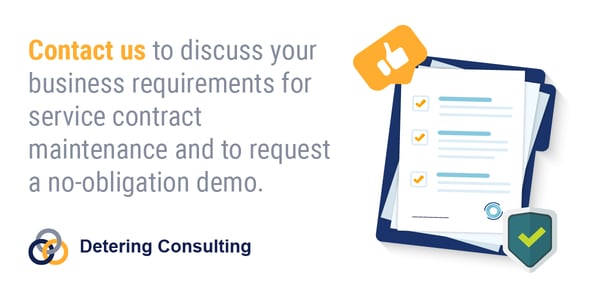Many business areas are stakeholders in how service contracts and extended warranties and associated business rules are formulated, marketed, billed, and measured for profitability. Marketing teams, IT management, sales, customer service, and finance each have a significant role to play in determining the success of these programs and how they are supported.

SAP CRM Contract Management Best Practices
If you’re involved with any aspect of SAP CRM service contract management best practices, you must utilize industry-standard best practices in establishing, managing, and tracking the success of these service and extended warranty programs.
Most organizations with products and services take great pride in the quality and value that they provide to their customers. Whether the focus is on technology or other products, equipment maintenance, or home repair services, ensuring customers that you stand behind your offerings is critical to business longevity.
Service contracts and extended warranties provide customers with the confidence that your business will be there to maintain, service, or replace the products they rely on you to support.
Managing service contracts and warranty commitments is a critical factor in any successful business. Making this aspect of your business profitable and efficient requires attention to numerous best practices – from business management processes to regulatory compliance issues.
It’s important to follow service contract management best practices to provide customer confidence in your brand identity and to increase the profitability of your program. SAP service contract billing solutions should encompass at least most of these practices.
1. Data Accuracy
Incomplete or inaccurate information can mean the end of customer confidence in your business. Managing contracts or warranties on spreadsheets or applications outside of your critical business systems such as finance or ERP applications create many potential issues:
- Lack of systematic capability in identifying covered products or services – if your system cannot determine coverage, it must be done manually with more opportunity for errors
- Incorrect charges on billing documents – this can mean disputed invoices, delays in payments, unhappy customers, and wasted administrative time
- Lost opportunities for renewals and contract additions
Integrating service contract management with critical business systems ensures the strategic reuse of enterprise master data across departments. Product development, customer service, marketing, finance, and contract management all work from a common set of data.
Warranty contracts and service agreements must contain accurate information to maximize business value and reduce administrative costs.
2. Meeting Specific Industry Requirements
Flexibility is important in selecting the service contract management and billing solution for your company. Every industry has variations on what type of equipment is in use, maintenance requirements, and extended warranty coverage that may be needed.
Aircraft manufacturers, for example, have specific requirements to manage engines based on usage or run hours, structural components that may be based on flight hours, and hydraulic systems based on other criteria.
Electronics companies can have an entirely different set of challenges, focusing on circuit board failures, accidental damage from dropping phones, cracked displays, and more.
Selecting SAP contract management software that meets the right criteria for your business can be a challenge in itself.
3. Simplicity in Program Comprehension
Contracts must certainly contain legally binding terms and conditions, but they should also be as easy as possible for both parties to read and comprehend.
It’s important to your administrative team and customers to utilize terms that are universally used and accepted for inclusion in warranty and service contracts. Example standard terms that may apply to your contracts and customers include:
- 24/7 – should indicate that there is continuous coverage – any exclusions, such as holidays?
- All-inclusive – everything is covered – is it?
- Parts and labor – this should also be clear unless there are underlying exclusions that should be noted
- Level of coverage – if your service contracts include tiered service levels at varying prices, clearly define the level that pertains to each item and program
- Entitlements – this needs to be spelled out in detail, yet clearly worded. What is the owner of the contract entitled to? For example: Online customer support, periodic inspections, regular maintenance? Legal terms are necessary, of course, but avoid over-complicated verbiage wherever possible.
4. Automate
Manual processes should be avoided wherever possible. Contract preparation should be contained within your selected system. Every manual function presents an opportunity for errors or omissions.
Bolt-on or interfaced systems can generate problems such as billing delays, incorrect invoices, products that are not correctly specified on contracts, and accounting errors.
Automation should include billing generation, contract approvals, and workflow, such as alerts when contracts are due for renewal. Automate warranty management and service contracts to gain accuracy and efficiency in your programs.
Billing documents should be generated electronically and integrated with financial systems to avoid errors and manual input.
5. Evaluate Business Requirements Thoroughly
Spend an adequate amount of time and company resources to identify all requirements of the service contract management system. Include representatives from all stakeholder departments – marketing, sales, service, finance, IT, legal, and product management.
If the system cannot support the requirements identified by your project team, look elsewhere. Consider the variety of products and types of warranty programs you want to offer now and in the future. There are many types of coverage that you may need to consider:
- Regular maintenance
- Field service visits and inspections
- Depot repair
- Repair or replacement options
- Loaner options
- Usage-based service contracts
- Accidental damage from handling (ADH)
- Managed services
- Not to exceed contract structures
6. Make It Easy for Your Customers to Buy Contracts
If no contract is offered or signed at the time of product purchases, make it as easy as possible for customers to sign up for service contracts or extended warranty programs.
Your best practices for managing service contracts and warranty programs include offering and securing coverage, to begin with. Lost opportunities become lost revenue for your business.
Send automated alerts to your customers that provide program options available and offer ease of contacting you via “Buy now” buttons on your website and on “We would love to hear your feedback” emails. Provide links that direct them to personal contacts with a knowledgeable contract administrator, possibly initiating a chat session that is preloaded with the serial number and contact info for that product. A chatbot might be able to manage basic questions, service contract initiation, and payment.
Your best opportunity for closing a deal remains at the time of initial service or product purchase. This promotes a positive impression of service beyond the sale, creating brand loyalty.
7. Communicate Effectively and Positively with Your Customers
Implementing a service contract management program that is integrated with business functions such as billing and finance offers multiple opportunities for keeping the lines of communication open with your program clients.
As expiration dates approach, you can generate courteous alerts of time to renew, even offering customer support to assist in reviewing existing coverage and offer additional options.
Upon renewal and creation of billing documents, thank you messages can be generated to create a positive impression of your company and your focus on customers. Always provide an additional item of value for your customers like access to FAQs, how-to articles, sweepstakes, or surveys.
This best practice may not be easily implemented with custom or interfaced applications. Integrated solutions that are part of your SAP environment facilitate ease of implementing these activities and timely event management.
8. Implement a Service Contract Program
Nearly any company that sells products or services has the basis for offering extended warranties and service or maintenance contracts. This can range from complex aeronautics products to office printers, computers, or HVAC systems for residential or business customers.
Customers are always seeking solutions that will help them control their costs. If your business is not offering these options, you can be missing out on a long-term revenue stream.
Simply put – a critical best practice for a service contract maintenance program is – have one.
 Service Contract Process Lifecycle Diagram
Service Contract Process Lifecycle Diagram
9. Establish Key Performance Indicators Based on Actual Data
Ensuring profitability of service and warranty programs includes continuous monitoring of program costs vs. revenue. Integrated systems capture financial results accurately for periodic review of performance. This permits any adjustments in costs and coverage that may be appropriate:
- Identify products that are requiring excessive service
- Tracking the number of service calls to individual customers
- Analyzing usage-based data that indicates where coverage may not be appropriate for actual product use
- Provide management with key information related to products or components that frequently fail – potentially justifying a recall or redesign
Key performance indicators will vary across industries, but several may be common for most businesses:
- Renewal rates – how often do customers renew their contracts and extended warranties, including reasons for non-renewals
- First-time vs. post-sales purchases – how many customers purchase programs at the time of sale
- Performance – is maintenance or service being performed on schedule, to support all agreements
- Profitability – which is most profitable, and why
- Verification that entitlements are being met for contract owners
These KPIs and other related ones can all be reported directly out of the SAP system.
10. Compliance Review
Many industries are responsible for maintaining compliance with federal, state, and local agencies. Ensure that all contracts and extended warranties are in full compliance with regulatory agencies and industry standards.
Regular reviews must be conducted to ensure you remain in compliance. Standardize contracts with terms and conditions to facilitate compliance reviews and hold regular audits for adherence to legal requirements.
Beyond legal requirements, conduct reviews to verify that your company is following all the terms provided for in contracts. This will limit exposure from disputes with customers related to actual performance vs. terms of the agreements.
11. Integration is Critical to Many of These Best Practices
Maintaining a comprehensive program of service contract management and extended warranty support requires data accuracy and reliable information. Only integrated systems can provide the level of confidence businesses need to implement, manage, and monitor programs efficiently and profitably.
Integration provides for common data between contract management, ERP, billing, and financial systems. Analysis of KPIs, billing accuracy, and renewal statistics are all greatly simplified through the use of an integrated suite of applications.
SAP provides fully integrated business applications but does not offer the level of service contract management tools needed by most businesses.
Detering Consulting Helps Your Business Manage Service Contracts and Warranty Programs
Detering Consulting has decades of experience in core SAP functionality and management of service and extended warranty programs. Surprisingly, we have discovered in our practice that many SAP customers manage such programs outside of SAP, or through a mix of external methods and manual creation of billing documents.
Detering’s contract management solution utilizes native SAP ECC or S/4HANA infrastructure, mostly from SAP SD, CS, PM, MM, and FICO, to generate accounting entries and performs billing document creation seamlessly and without manual intervention. Full integration with SAP applications is a leading advantage of implementing a Detering Consulting business solution.
Contact us to discuss your business requirements for service contract maintenance and to request a no-obligation demo.

